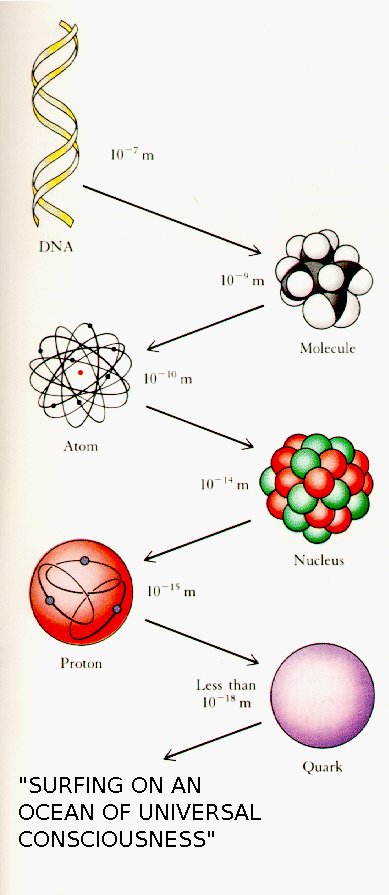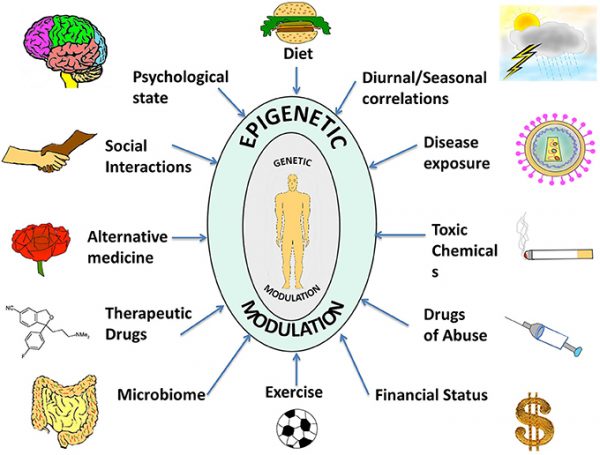
Epigenetics, as a simplified definition, is the study of biological mechanisms that will switch genes on and off.
What are genes?
A gene is the basic physical and functional unit of heredity. Genes are made up of DNA. Some genes act as instructions to make molecules called proteins. … Every person has two copies of each gene, one inherited from each parent.
Gene or plural noun: genes (in informal use) is a unit of heredity which is transferred from a parent to offspring and is held to determine some characteristic of the offspring.
Your proteins are coded directly by your genes!
Genes, in technical terms, is a distinct sequence of nucleotides forming part of a chromosome. The order of which determines the order of monomers in a polypeptide or nucleic acid molecule which a cell (or virus) may synthesize.
You are made up of:
- Cells are fundamental working units of every human being. All the instructions required to direct their activities are contained within the chemical deoxyribonucleic acid, also known as DNA.
- DNA from humans is made up of approximately 3 billion nucleotide bases. There are four fundamental types of bases that comprise DNA – adenine, cytosine, guanine, and thymine, commonly abbreviated as A, C, G, and T, respectively.
- The sequence, or the order, of the bases is what determines our life instructions. Interestingly enough, our DNA sequence is mostly similar to that of a chimpanzee. Only a fraction of distinctively different sequences makes us human.
- Within the 3 billion bases, there are about 20,000 genes. Genes are specific sequences of bases that provide instructions on how to make important proteins – complex molecules that trigger various biological actions to carry out life functions.
In other words, Your DNA gives the instructions for various functional proteins to be produced inside your cells. This is the central
principle or set of principles laid down by a Scientific authority as incontrovertibly true.
Genetics has a new central principle called epigenetics.
Epigenetics affects how genes are read by cells, and subsequently whether the cells should produce relevant proteins.
Epigenetics: Myths and Facts
It used to be thought that we were born with a fixed genetic blueprint that determined our traits, behaviors, and health. Now, discoveries in the field of epigenetics have radically rebooted this theory by demonstrating that our DNA is more of a switchboard than a blueprint. Epigenetics is the study of how external forces, such as your environment and life experiences, trigger on-off mechanisms on the genetic switchboard. Epigenetic scientists are examining the mechanisms by which genes become expressed or silenced with the goal of understanding how we can influence their activity and change our genetic health outcomes.
- Epigenetics Controls Genes. This is achieved through (a) nature: epigenetics is what determines a cell’s specialization (e.g., skin cell, blood cell, hair cell, liver cells, etc.) as a fetus develops into a baby through gene expression (active) or silencing (dormant); and (b) nurture: environmental stimuli can also cause genes to be turned off or turned on.
- Epigenetics Is Everywhere. What you eat, where you live, who you interact with, when you sleep, how you exercise, even aging – all of these can eventually cause chemical modifications around the genes that will turn those genes on or off over time. Additionally, in certain diseases such as cancer or Alzheimer’s, various genes will be switched into the opposite state, away from the normal/healthy state.
- Epigenetics Makes Us Unique. Even though we are all human, why do some of us have blonde hair or darker skin? Why do some of us hate the taste of mushrooms or eggplants? Why are some of us more sociable than others? The different combinations of genes that are turned on or off is what makes each one of us unique. Furthermore, there have been indications that some epigenetic changes can be inherited.
- Epigenetics Is Reversible. With 20,000+ genes, what will be the result of the different combinations of genes being turned on or off? The possible arrangements are enormous! But if we could map every single cause and effect of the different combinations, and if we could reverse the gene’s state to keep the good while eliminating the bad… then we could theoretically* cure cancer, slow aging, stop obesity, and so much more.

Presented in Nessa Carey’s book Epigenetics Revolution!
Think of your lifespan as a very long movie. Your cells are the actors and actresses that are essential units that make up your movie. Your DNA, in turn, is your script — instructions for all the participants of the movie to perform their roles.
Then your DNA sequence are the words on the script, and certain blocks of these words that instruct key actions or events to take place would be the genes.
The concept of genetics would be like screenwriting. Follow the analogy so far? Great. The concept of epigenetics, then, would be like directing.
The script can be the same, but the director can choose to eliminate or tweak certain scenes or dialogue, altering the movie for better or worse. After all, Steven Spielberg’s finished product would be drastically different than Woody Allen’s for the same movie script, wouldn’t it?

